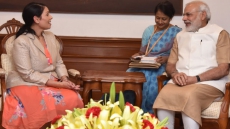After China blocked India's bid for membership in the Nuclear Suppliers Group (NSG), the two countries had a “lengthy discussion” on the issue in a bilateral meeting between External Affairs Minister Sushma Swaraj and Chinese Foreign Minister Wang Yi here on Saturday
“Lengthy discussion on India's NSG membership,” External Affairs Ministry spokesperson Vikas Swarup said while briefing the media after the three-hour-long talks.
“The External Affairs Minister outlined the importance of meeting our clean energy goals in the context of COP-21 (Conference of Parties climate summit held in Paris last year),” he said.
Swarup said that India offered to discuss any technical issues China might have and it was agreed that the Directors General of Disarmament of the two countries would meet soon.
At the NSG plenary held in Seoul in June this year, China blocked India's bid for membership on the ground that a country joining the 48-member group should be a signatory to the nuclear Non-Proliferation Treaty (NPT).
Saturday's talks also focused on other bilateral issues, regional and global developments and India's preparations to host the BRICS (Brazil, Russia, India, China, South Africa) Summit this year.
According to Swarup, overall, the discussions were positive, constructive and held in an open spirit.
He said progress in bilateral ties was reviewed, as also challenges on some recent issues.
Discussing issues of mutual importance. EAM @SushmaSwaraj meets with her counterpart Chinese FM Wang Yi in New Delhi pic.twitter.com/ZcuvUpwzIv
— Vikas Swarup (@MEAIndia) August 13, 2016
“Positive assessment of expanding investments, more infrastructure cooperation, easier visas, greater tourism and expanded cultural, academic and civil society interactions,” the spokesperson said.
The issue of China vetoing India's bid to put Pathankot airbase attack mastermind and Jaish-e-Mohammad chief Masood Azhar on the UN terror list also came up for discussion.
Swarup said that China was urged to revisit its technical hold in line with its own professed zero tolerance towards terrorism.
Sushma Swaraj also conveyed to Wang India's concerns on the China-Pakistan Economic Corridor.
“The situation on the border was reviewed and further steps to strengthen peace and tranquility were discussed,” Swarup said.
It was also agreed to set up a new mechanism at the level of Foreign Secretaries to discuss ties.
Regional and international issues including the implications of Britain's exit from the European Union, the situation in Korean Peninsula, UN Security Council reforms and forthcoming G20, East Asia and BRICS summits were also on the agenda.
“South China Sea was not brought up by China,” Swarup said.
An international arbitration tribunal in the Permanent Court of Arbitration (PCA) in the Hague ruled on July 12 that China violated the Philippines' rights in the South China Sea, one of the busiest commercial shipping routes in the world.
The court accused China of interfering with the Philippines' fishing and petroleum exploration, building artificial islands in the waters and failing to prevent Chinese fishermen from fishing in the zone.
The tribunal held that fishermen from the Philippines had traditional fishing rights in Scarborough Shoal in the South China Sea and that China had interfered with these rights by restricting their access.
The court held that Chinese law enforcement vessels unlawfully created a serious risk of collision when they physically obstructed Philippine vessels in the region.
China is locked in disputes over the Spratly and Paracel groups of islands in the South China Sea with other countries of the region.




